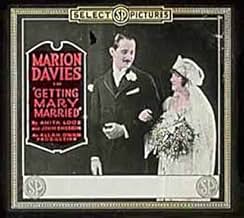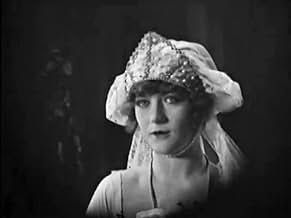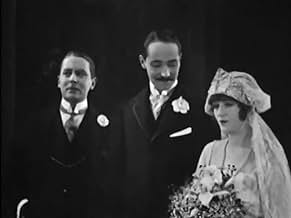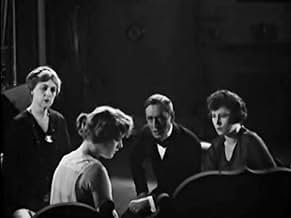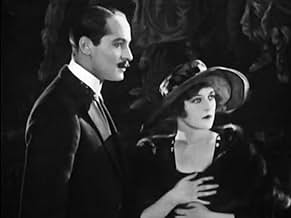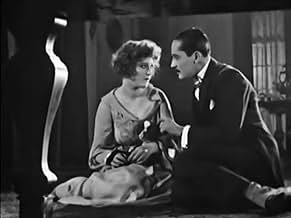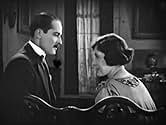Agrega una trama en tu idiomaA young woman must resist the charms of a handsome stranger and stay single if she wants to inherit a fortune.A young woman must resist the charms of a handsome stranger and stay single if she wants to inherit a fortune.A young woman must resist the charms of a handsome stranger and stay single if she wants to inherit a fortune.
- Dirección
- Guionistas
- Elenco
- Dirección
- Guionistas
- Todo el elenco y el equipo
- Producción, taquilla y más en IMDbPro
Opiniones destacadas
Marion Davies cannot stand her stuffy step father Frederick Burton (I), but finds herself even worse off when he dies and leaves his fortune to her on condition that she live with his brother Elmer Grandin for a year without marrying so she will become a lady. Elmer Grandin, his wife Amelia Summerville, and daughter Constance Beaumar make it tough on Marion Davies so they can inherit the money, but she catches the eye of eligible bachelor Norman Kerry.
Anita Loos' titles cannot save a dumb story and ordinary acting.
Anita Loos' titles cannot save a dumb story and ordinary acting.
When Marion Davies' obnoxious and rich stepfather dies, she is told she will inherit everything if she learns decent manners by living a year with his even more obnoxious brother and family. She wants to refuse, but decides to fulfill the terms of the will to repay people who invested in her stepfather's crooked schemes. However, that brother is residuary heir if she fails, so they determine to make her life so miserable that she will throw up her hands. Fortunately, Norman Kerry and she fall in love....
With Allan Dwan directing from a script by Anita Loos and John Emerson, this should have been a much better movie. However, despite some great bits and fine performances, Marion Davies is surprisingly uninteresting. She is amazingly beautiful, but for someone who in the next two decades would offer some marvelous comedic performances, she is rather inert. I strongly suspect that she was still learning her craft.
Even with that underwhelming performance, this is still a fine movie. I suspect that Miss Davies was trying to be dignified for the sake of her lover and producer, William Randolph Hearst, who preferred her in more dignified, historical roles.
With Allan Dwan directing from a script by Anita Loos and John Emerson, this should have been a much better movie. However, despite some great bits and fine performances, Marion Davies is surprisingly uninteresting. She is amazingly beautiful, but for someone who in the next two decades would offer some marvelous comedic performances, she is rather inert. I strongly suspect that she was still learning her craft.
Even with that underwhelming performance, this is still a fine movie. I suspect that Miss Davies was trying to be dignified for the sake of her lover and producer, William Randolph Hearst, who preferred her in more dignified, historical roles.
Davies goes to live with the Boston connivers so she can inherit her step-father's money so she can pay back a widow he bilked.
The Boston family try everything to get Davies to break the terms of the will, including letting her run around with Ted Barnacle (Matt Moore) who is a friend of wealthy Jimmy Winthrop (Norman Kerry). But they don't know that he's just a beard and that Davies is actually meeting Kerry (and his mother). Meanwhile Kerry pretends to be interested in the mousy Boston daughter.
Kerry manipulates the stock of some worthless copper mine the step-father owned. Of course the Boston buzzards think they're going to be very rich as they watch the stock soar and continue to try to get rid of Davies. But Kerry is only manipulating the stock so the old widow can get back her money.
It all comes to a crashing conclusion when the Boston bunch are confronted by Kerry and his mother and Kerry admits his stock deal.
Davies here is 22 and incredibly pretty with her frizzy teens hairdo. She also has a few nice light moments with her Boston terrier (a sneak peak at her screwball persona in the late silent era). This is the pre-Hollywood Davies that Hearst fell in love with (Davies was on Broadway in a series of shows from 1915-20). Kerry and Moore both have fun with their characters.
The ending seems a big rushed. The print is very VERY good with only a minute of minor deterioration. All the reel change info is intact (5 reels) and the intertitles very clean (and funny, written by John Emerson and Anita Loos). Well directed by Allan Dwan.
This is not a lost or forgotten masterpiece, but shows us a very young Marion Davies, already in full command of screen acting and as always, she's better than history has told us. Very charming.
The Boston family try everything to get Davies to break the terms of the will, including letting her run around with Ted Barnacle (Matt Moore) who is a friend of wealthy Jimmy Winthrop (Norman Kerry). But they don't know that he's just a beard and that Davies is actually meeting Kerry (and his mother). Meanwhile Kerry pretends to be interested in the mousy Boston daughter.
Kerry manipulates the stock of some worthless copper mine the step-father owned. Of course the Boston buzzards think they're going to be very rich as they watch the stock soar and continue to try to get rid of Davies. But Kerry is only manipulating the stock so the old widow can get back her money.
It all comes to a crashing conclusion when the Boston bunch are confronted by Kerry and his mother and Kerry admits his stock deal.
Davies here is 22 and incredibly pretty with her frizzy teens hairdo. She also has a few nice light moments with her Boston terrier (a sneak peak at her screwball persona in the late silent era). This is the pre-Hollywood Davies that Hearst fell in love with (Davies was on Broadway in a series of shows from 1915-20). Kerry and Moore both have fun with their characters.
The ending seems a big rushed. The print is very VERY good with only a minute of minor deterioration. All the reel change info is intact (5 reels) and the intertitles very clean (and funny, written by John Emerson and Anita Loos). Well directed by Allan Dwan.
This is not a lost or forgotten masterpiece, but shows us a very young Marion Davies, already in full command of screen acting and as always, she's better than history has told us. Very charming.
One of the most highly regarded films ever produced, 1941's "Citizen Kane," is acklowledged as a loose biography of mega-media owner William Randolph Hearst. Within Orson Welles' narrative is his Hearst-like protagonist, Charles Foster Kane, who has a mistress in an untalented actress/singer by the name of Susan Alexander. Movie viewers at the time felt Welles was parodying Hearst's well-known paramour, actress Marion Davies. The portrayal of Davies was felt by many who knew her talents as totally unfair. Even Welles admitted Susan Alexander was a composite of several actresses and he didn't intend her to be mistaken for that of Ms. Davies.
Modern viewers are able to judge Davies' work in a number of her films today. Her earliest surviving movie is April 1919's "Getting Mary Married." The John Emerson/Anita Loos script provided Davies with her fifth film she appeared in as well as her first comedy. She plays the daughter of a wealthy man who has stipulated she must live with her brother for one entire year before she gets his fortune. When Davies relocates to her brother's, it sets off a series of madcap events involving family and new-found friends.
Early on Davies displayed a talent for entertaining, signing with the Ziegfeld Follies when she was 19 in 1916. Her stunning body attracted a fan-base of young men, one including the married Hearst, who purportedly sat in the front row every night for eight weeks when the Follies was in New York City. When the smitten Hearst saw her in her first film, 1917's "Runaway Romany," he formed a movie company within Paramount Pictures in 1918 and signed Davies to a contract. The 58-year-old Hearst heavily promoted the 21-year-old actress, where both were getting quite intimate with one another. His newsreels played in movie theaters showing her social activities while his Los Angeles Examiner paper assigned a full-time reporter to detail her daily life. In all, while Hearst put her and her family in a posh Manhattan townhouse (corner of Riverside Drive and W. 105th Street), the media tycoon spent over $7 million promoting Davies' movie career.
All the promotions and her talent on screen proved to pay off big dividends as Davies was considered the most popular actress at the box office during the 1922-1923 time period, appearing in a couple of megahit productions.
Modern viewers are able to judge Davies' work in a number of her films today. Her earliest surviving movie is April 1919's "Getting Mary Married." The John Emerson/Anita Loos script provided Davies with her fifth film she appeared in as well as her first comedy. She plays the daughter of a wealthy man who has stipulated she must live with her brother for one entire year before she gets his fortune. When Davies relocates to her brother's, it sets off a series of madcap events involving family and new-found friends.
Early on Davies displayed a talent for entertaining, signing with the Ziegfeld Follies when she was 19 in 1916. Her stunning body attracted a fan-base of young men, one including the married Hearst, who purportedly sat in the front row every night for eight weeks when the Follies was in New York City. When the smitten Hearst saw her in her first film, 1917's "Runaway Romany," he formed a movie company within Paramount Pictures in 1918 and signed Davies to a contract. The 58-year-old Hearst heavily promoted the 21-year-old actress, where both were getting quite intimate with one another. His newsreels played in movie theaters showing her social activities while his Los Angeles Examiner paper assigned a full-time reporter to detail her daily life. In all, while Hearst put her and her family in a posh Manhattan townhouse (corner of Riverside Drive and W. 105th Street), the media tycoon spent over $7 million promoting Davies' movie career.
All the promotions and her talent on screen proved to pay off big dividends as Davies was considered the most popular actress at the box office during the 1922-1923 time period, appearing in a couple of megahit productions.
¿Sabías que…?
- TriviaThis is the oldest Marion Davies film known to exist. This was her fifth starring film.
Selecciones populares
Inicia sesión para calificar y agrega a la lista de videos para obtener recomendaciones personalizadas
Detalles
- Tiempo de ejecución1 hora 5 minutos
- Color
- Mezcla de sonido
- Relación de aspecto
- 1.33 : 1
Contribuir a esta página
Sugiere una edición o agrega el contenido que falta

Principales brechas de datos
By what name was Getting Mary Married (1919) officially released in Canada in English?
Responda
